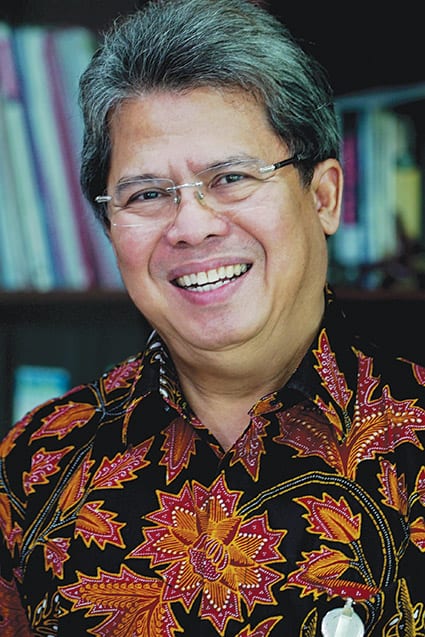
 A powerful seed of Indonesia’s human rights movement was planted more than 8,000 miles away, in a Berkeley Law classroom. While studying for his LL.M. degree, Todung Mulya Lubis ’78 took an International Human Rights Law class with Professor Frank Newman. The course changed the direction of his career—and his country.
A powerful seed of Indonesia’s human rights movement was planted more than 8,000 miles away, in a Berkeley Law classroom. While studying for his LL.M. degree, Todung Mulya Lubis ’78 took an International Human Rights Law class with Professor Frank Newman. The course changed the direction of his career—and his country.
“I began to spend more time studying human rights, interacting with activists, and attending rallies and demonstrations,” Lubis says. “I realized I had a lot to do to help improve the human rights situation in Indonesia.”
On May 13, Lubis—called “Jakarta’s voice for the rule of law”—received UC Berkeley’s prestigious Elise and Walter A. Haas International Award. The honor brought back some life-changing memories.
“Professor Newman told his students that when you became a human rights activist, what matters is human beings, not nationality,” Lubis recalls. “I agree that fighting for human rights should not be stopped by national boundaries.”
Lubis spent two years in Berkeley, to further his career and to escape danger. As a young lawyer, some of his pro bono work defended media outlets that exposed corruption among Indonesia’s ruling elite. He received death threats and had case documents stolen from his office during the authoritarian regime of Suharto, whose three-decade dictatorship was one of the most brutal of the 20th century.
After Lubis earned his LL.M., Berkeley Law Professor Richard Buxbaum asked him to write a joint textbook on economic law in developing nations and encouraged him to help his country. Upon returning home, Lubis galvanized support for reform, led his nation’s Legal Aid Foundation, and published the first Indonesian Human Rights Report.
“It seemed ironic to have such reports published by Amnesty International and the U.S. State Department,” he says. “Indonesia needs human rights reports prepared and published by Indonesians. I just filled the void, having been inspired by people like Professor Newman and Professor Buxbaum.”
Lubis is the co-founder of Lubis, Santosa & Maramis, a top Jakarta firm specializing in corporate and commercial matters, intellectual property, and dispute resolution. But his country’s fate remains intertwined with his work.
Thanks partly to his efforts, Indonesia has made important legal reforms in recent years. It separated the judiciary from the executive, and established the Constitutional Court and the Judicial Commission to strengthen checks and balances. Many courts now publish decisions on their websites, and judicial selections are more transparent.
“These are notable achievements,” Lubis says. “But problems remain—corruption, collusion, nepotism. Corruption in Indonesia is among the worst in the world, including within the judiciary. This is our challenge.”
After decades of pushing for change, Lubis shows no sign of slowing down. He holds leadership roles with several Indonesian NGOs that focus on legal reform, governmental transparency, and human rights.
“I still have a lot to do,” says Lubis, 67. “I still owe a lot to my people.”
—Andrew Cohen